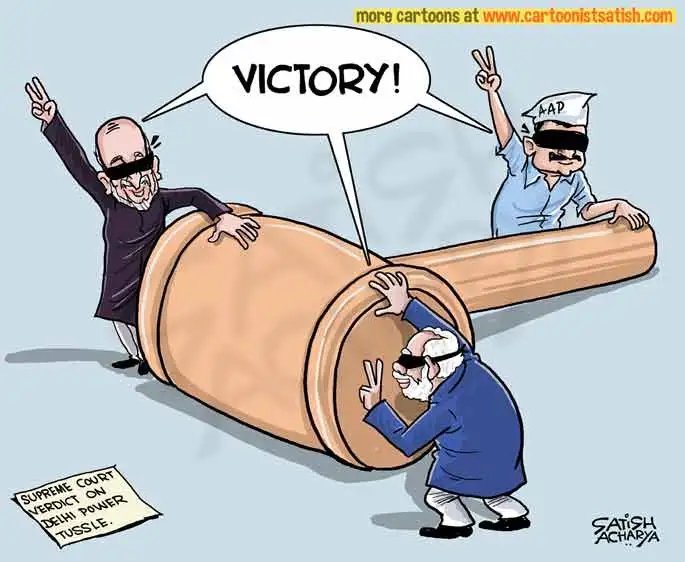Delhi Government, so close, yet so far! Part -1

In 2015, the Union Home Ministry issued a notification empowering the National Capital Territory (‘NCT’) of Delhi’s Lieutenant Governor to exercise control over issues related to services, public order, police and land. The notification led to a stand-off between the Government of NCT of Delhi (‘GNCTD’) and the Union of India. Since 2015, GNCTD has argued that it cannot effectively govern NCT of Delhi if civil servants lay allegiance to the unelected Lieutenant Governor. On May 11th 2023, I thought the stand-off had concluded in GNCTD’s favour when a constitution bench unanimously ruled that the GNCTD, and not the Lieutenant Governor, has executive power over services. In fact, another constitution bench had arrived at the same conclusion in July, 2018 and the only reason the bench on May 11th 2023 had to clarify the previous ruling was because two judges bizarrely arrived at a contradictory ruling in 2019. But as it turns out, despite two constitution benches unanimously ruling in favour of GNCTD, the dispute is far from over. On May 20th, 2023, the Union Government promulgated an ordinance, empowering a body (which it controls) to decide posting/transfers of a class of civil servants.
In this Part- 1 of this post, I breakdown Supreme Court’s judgment of May 11th, 2023. In Part – 2, I will examine whether the ordinance is in conformity with the judgment or is in fact a Union Government’s brazen attempt to undo it and unconstitutionally exercise control over civil servants in Delhi.
The Judgment
The judgment begins by recognising the unique status of the NCT of Delhi in our polity (See Para 12 to 19). The Bench notes that unlike Andaman & Nicobar or Lakshwadeep, which are directly administered by the President, NCT of Delhi has a legislative assembly. Further, unlike Pondicherry, which also has a legislative assembly, NCT of Delhi’s assembly members are chosen by direct elections. Thus, a representative form of government separates Delhi from other Union Territories. The Court appreciates this fact while interpreting the provision in dispute, which is Article 239AA(3)(a):
“239AA. Special provisions with respect to Delhi:
..(3) Subject to the provisions of this Constitution, the Legislative Assembly shall have power to make laws for the whole or any part of the National Capital Territory with respect to any of the matters enumerated in the State List or in the Concurrent List in so far as any such matter is applicable to Union territories except matters with respect to Entries 1, 2 and 18 of the State List and Entries 64, 65 and 66 of that List in so far as they relate to the said Entries 1, 2 and 18.“
The Union Government had argued that the phrase “in so far as any such matter is applicable to Union territories” means that legislative assembly can legislate on matters in State List (List 2) and Concurrent List (List 3) only to the extent they are applicable to Union Territories. Since, Entry 41 of List II is regarding “State Public Services; State Public Commission”, the legislative assembly of a union territory cannot legislate on it. Consequently, the GNCTD cannot exercise control over services as its powers only extend to the matters on which NCT of Delhi’s assembly can legislate [Article 239AA(4)].
The Court rejects this argument because of the unique status of NCT of Delhi. The Court notes that the Union’s interpretation of the phrase mentioned above would restrict the legislative powers of elected members of the assembly. The provision anyway explicitly restricts the legislative power any with respect to Entries 1, 2 and 18 and it cannot be read to further exclude legislative powers of the assembly (See Para 62 to 65). In view of this understanding of the Article 239AA(3)(a), the Court rules that the legislative assembly of NCT of Delhi can legislate on services, and thus, GNCTD can exercise control over civil servants.
So close but yet so far for GNCTD as this is not the Court’s only finding. The Court also interpets other provisions of Article 239AA and provides clarity on how the Constitution demarcates the legislative and executive powers between Union of India and NCT of Delhi. Of particular significance here are:
- Article 239AA(3)(b) which provides that the Parliament can “make laws with respect to any matter” relating to NCT of Delhi; and
- Article 239AA(3)(c) which states that the laws made by the Parliament shall prevail over laws by the legislative assembly of NCT of Delhi.
Considering these articles, the Court arrives at a striking conclusion – “for the purposes of NCTD, both List II and List III are “concurrent lists”’” (See Para 85). This is important because this means that whatever the elected legislative assembly of NCT of Delhi has to say regarding its civil servants, it will always be subject to what the Parliament says (See Para 95).
Summary
| Executive Power | Legislative Power | |
| Union of India | Every entry in List 1; and Entries 1, 2 and 18 in List 2. | List 1, 2 and 3. |
| NCT of Delhi | Every entry in List 2 apart from 1, 2 and 18; and every entry in List 3 | Every entry in List 2 apart from 1, 2 and 18; and every entry in List 3 |
By relying (almost) on the finding above, the Union Government has now passed an ordinance restricting GNCTD’s power over civil servants. Ordinances have the same force and effects as laws of Parliament (Article 123). Thus, at first glance, the ordinance does seem in conformity with the judgment, as commentators have argued. In the next post, we will examine the ordinance further, particularly Section 3A which states that the legislative assembly cannot enact any laws with respect to Entry 41 of List.



👌👏🏻👏🏻